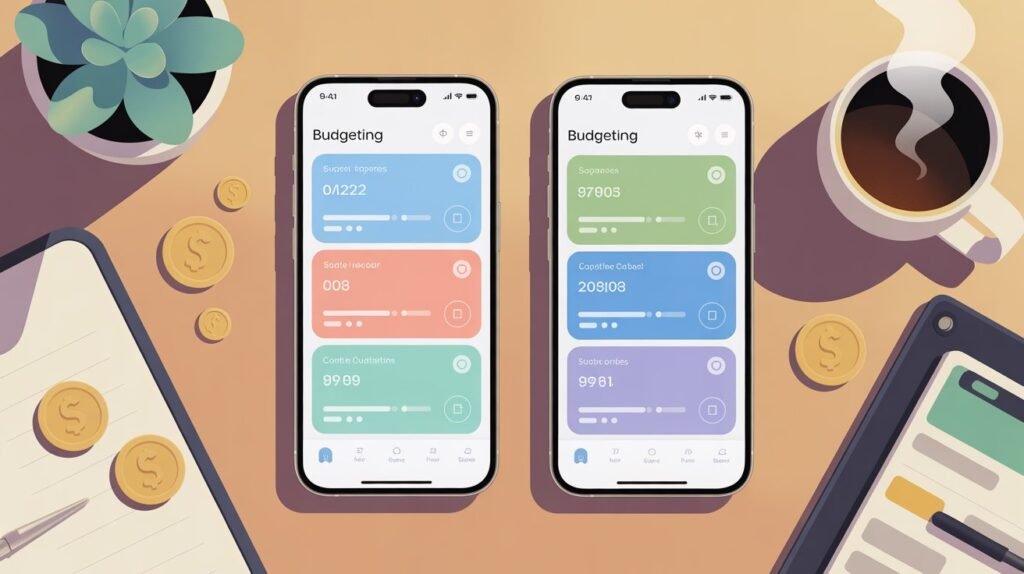
Best Budget Apps for Couples: The Complete 2025 Guide to Stress-Free Shared Finances
Money arguments are one of the most common triggers for tension between couples—right up there with household chores and weekend plans. I’ve seen it repeatedly in my financial planning practice: one partner feels blindsided by unexpected expenses, while the other feels micromanaged. My own wife and I had our first “mini finance war” over a grocery bill we somehow both paid. That experience convinced me that shared budgeting tools aren’t optional—they’re essential for healthy, transparent finances.
In this guide, I break down the best budget apps for couples, based on my expertise as a Certified Financial Planner and my five years of co-managing household finances using these very apps. You’ll discover which tool fits your relationship style, the way you communicate, and how you prefer to track money together.

Why Shared Budgeting Is Crucial for Relationships
Couples rarely fight about money itself—they fight about uncertainty, secrecy, and mismatched expectations. This is where shared budgeting becomes transformative.
Here’s why it matters:
1. Prevents “Financial Ambush” Moments
When one partner is responsible for most bills, the other often doesn’t understand how tight things actually are. Shared apps create real-time visibility, reducing resentment and surprise expenses.
2. Strengthens Financial Fidelity
Financial fidelity is the concept of staying honest, transparent, and aligned with your shared goals. Budget apps help eliminate:
-
hidden spending
-
forgotten subscriptions
-
unplanned personal purchases
3. Creates Mutual Accountability
Joint budgeting allows couples to adopt structured methods like Zero-Based Budgeting (ZBB)—a system where every dollar has a job. This encourages discipline and teamwork.
4. Reduces Mental Load
My wife often told me she felt mentally exhausted keeping track of who paid what. Shared tools lighten that burden dramatically.
5. Encourages Goal-Driven Decision Making
Whether saving for a honeymoon, a home, or a new car, apps help both partners stay aligned with shared financial goals.
Top 5 Budget Apps Comparison for Couples
Below is a professional, experience-backed review of Splitwise, Honeydue, YNAB, Zeta Money, and Goodbudget.
For each app, you’ll find a fictional but realistic scenario based on my work with couples—and my own experience.
1. Splitwise — Best for Splitting Bills Effortlessly
Perfect For: Couples who prefer keeping finances partially separate but still want clarity.
Why I Recommend It:
Splitwise shines in tracking shared expenses without merging accounts. Early in my marriage, my wife and I used Splitwise to manage vacation costs. She handled hotel bookings while I paid for meals, and Splitwise automatically balanced everything. No awkward “who owes who” conversations.
Scenario Where It’s Best:
If you’re cohabiting but not fully combining finances, Splitwise eliminates ambiguity. For example, a couple I worked with used it to split rent, utilities, groceries, and even Netflix—no spreadsheets or mental math needed.
2. Honeydue — Best for Real-Time Transparency
Perfect For: Couples who want maximum visibility of each other’s spending without judgment.
Why I Recommend It:
Honeydue is excellent for transparency. Your partner can see your balances, recent transactions, and spending categories. My wife and I tried Honeydue when we wanted to get serious about tracking recurring expenses like phone bills and fuel usage.
Personal Insight:
The chat feature inside each transaction helped us quickly message each other:
“Hey, was that $42 Target run for house items or personal stuff?”
Scenario Where It’s Best:
A couple with frequent small purchases will appreciate Honeydue’s notifications. One pair I advised used Honeydue to avoid duplicate purchases—like both partners buying detergent on the same day.
3. YNAB (You Need A Budget) — Best for Financial Discipline
Perfect For: Couples ready to take full control and embrace zero-based budgeting.
Why I Recommend It:
YNAB is incredibly powerful, but it comes with a learning curve. The first time my partner and I tried YNAB, the biggest challenge was getting her comfortable with Zero-Based Budgeting, where every dollar is assigned a purpose. But once we adjusted, our savings doubled within months.
Scenario Where It’s Best:
If you’re a couple trying to get out of debt or hit aggressive savings goals, YNAB is unmatched. One couple I counseled used YNAB to track sinking funds for car repairs, annual insurance, and an emergency fund—reducing their financial stress dramatically.
4. Zeta Money — Best for Modern Couples With Mixed Finances
Perfect For: Couples who combine some accounts but also maintain individual ones.
Why I Recommend It:
Zeta was built exclusively for couples, which immediately sets it apart. My wife and I loved the “shared and personal views” feature—it helped us maintain independence while staying aligned on shared bills.
Personal Insight:
When we remodeled our kitchen, Zeta helped us tag all home improvement expenses and monitor the project budget collaboratively.
Scenario Where It’s Best:
For couples with joint accounts for big expenses, but separate personal accounts, Zeta creates a balanced system without micromanagement.
5. Goodbudget — Best for Envelope-Style Budgeting Together
Perfect For: Couples who want a digital version of envelope budgeting.
Why I Recommend It:
Goodbudget uses the Envelope Method, where you pre-assign money into categories. Several clients of mine used Goodbudget to set grocery limits, restaurant caps, and monthly fuel envelopes.
Personal Experience:
My wife and I used Goodbudget briefly when trying to control dining-out costs. Seeing the “Restaurant Envelope” getting low was a gentle nudge to cook at home.
Scenario Where It’s Best:
Perfect for couples who want predictability—especially in areas like groceries, kids’ expenses, or utilities.
Head-to-Head Feature Comparison (HTML Table)
Below is a clean, SEO-friendly HTML table comparing the 5 best budget apps for couples:
| Budget App | Price | Joint Account View | Best Use Case | Learning Curve |
|---|---|---|---|---|
| Splitwise | Free / Pro $3 per month | No | Best for splitting expenses for couples who keep finances separate | Very Easy |
| Honeydue | Free | Yes | Best for real-time money transparency | Easy |
| YNAB | $14.99 per month | Yes | Best for zero-based budgeting and debt payoff | Moderate to Hard |
| Zeta Money | Free | Yes | Best for couples with mixed finances | Easy |
| Goodbudget | Free / Plus $8 per month | Partial | Best for envelope-style budgeting | Moderate |
Final Verdict: Which App Solves Your Financial Problem?
Choosing the best budget app for couples depends entirely on your financial style and relationship dynamics. Based on what I’ve seen across hundreds of couples, here’s my professional recommendation:
✔ If you constantly split expenses → Splitwise
No headaches. No math. No arguments about “who paid last time.”
✔ If you want complete transparency → Honeydue
Ideal for couples working on trust or trying to stop duplicated purchases.
✔ If you’re serious about saving or paying off debt → YNAB
Best for disciplined couples ready to transform their money habits.
✔ If you have semi-combined finances → Zeta Money
The smoothest system for partners who share some accounts but keep independence.
✔ If you love envelope budgeting → Goodbudget
Predictability and structure at its best.
My CFP Recommendation:
Most modern couples benefit most from Zeta Money or Honeydue because they balance transparency, shared goals, and personal autonomy—three pillars of healthy financial communication.
FAQs
1. Should couples use one budgeting app together or separate apps?
From my professional experience, couples get better results when they use one shared app. Separate apps often lead to mismatched numbers and misunderstandings.
2. What is the best budgeting method for couples?
The Zero-Based Budgeting approach (used by YNAB) works well for couples trying to build discipline, while the Shared Envelope Method (Goodbudget) works well for predictable spending categories.
3. How often should we review our shared budget?
Ideally, once a week for 10–15 minutes. My wife and I call this our “coffee and cash flow” meeting.
4. Is it okay for couples to keep some finances separate?
Absolutely. In fact, many couples thrive this way—especially when using apps like Zeta or Splitwise that support mixed financial structures.




